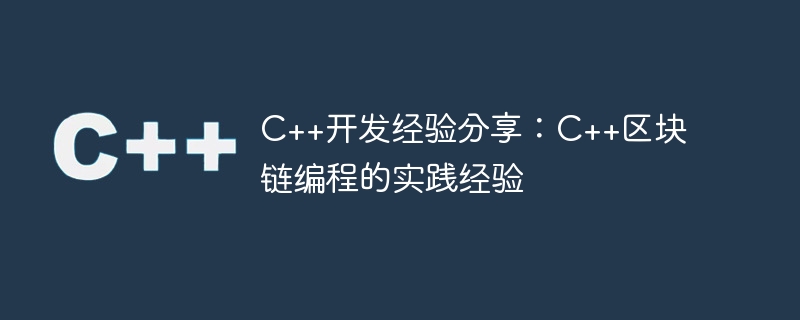Home >Backend Development >C++ >C++ development experience sharing: practical experience in C++ blockchain programming
C++ development experience sharing: practical experience in C++ blockchain programming
- PHPzOriginal
- 2023-11-22 12:07:031502browse

C Development experience sharing: Practical experience of C blockchain programming
Introduction
Blockchain technology as a new distributed ledger Technology has set off revolutions in many fields such as finance, medical care, and supply chain. As a high-performance programming language, C plays an important role in blockchain development. This article will share some of my practical experience in C blockchain programming.
- In-depth understanding of blockchain concepts
Before starting C blockchain programming, we need to have an in-depth understanding of the basic concepts of blockchain. The blockchain is composed of a series of blocks, each block contains multiple transaction records and is linked together through hash pointers. Understanding the data structure and workings of blockchain is critical to writing efficient C code.
- Use the right C library
C has a rich library, and choosing the right library can greatly simplify the workload of blockchain programming. For example, libbitcoin is a powerful C library that provides functions for processing blockchain data structures, creating and verifying transactions, and executing smart contracts. In addition, the Boost library is also a commonly used tool in C programming. It provides many functions for multi-threaded programming and data structure processing.
- Realize the basic functions of the blockchain
In C programming, we need to implement the basic functions of the blockchain, including creating blocks, adding transactions, and verifying transactions wait. In order to ensure the readability and maintainability of the code, we can encapsulate these functions into classes and functions, making full use of object-oriented design principles.
- Design efficient data structures
In blockchain programming, efficient data structures are crucial. The C language provides many data structure containers, such as vector, map, set, etc. According to specific needs, choosing the appropriate data structure can greatly improve the execution efficiency of the code.
- Processing the consensus algorithm of the blockchain
The consensus algorithm of the blockchain determines how the various nodes in the system reach agreement. In C programming, we need to conduct in-depth research on the consensus algorithm and implement the corresponding algorithm according to specific needs. For example, Bitcoin uses the Proof-of-Work algorithm, while Ethereum uses the Proof-of-Stake algorithm.
- Testing and debugging
In C blockchain programming, testing and debugging are indispensable steps. Write various test cases to verify the correctness of the code, and use debugging tools to locate and fix bugs. Good testing and debugging can improve the quality of your code and reduce errors in production environments.
- Protect the security of the code
Due to the complexity and value of the blockchain system, the security of the code is particularly important. We need to pay attention to guard against various common security threats, such as DDoS attacks, double payments, etc., and take corresponding security measures, such as encryption algorithms, firewalls, access control, etc.
Conclusion
C Blockchain programming is an area full of challenges, but it is also an area full of opportunities. By deeply understanding blockchain concepts, using appropriate C libraries, implementing basic functions, designing efficient data structures, handling consensus algorithms, testing and debugging, and securing code, we can write high-performance, safe and reliable blockchain applications . I hope the above sharing will be helpful to C blockchain programming. Let us embrace the new future of blockchain technology together!
The above is the detailed content of C++ development experience sharing: practical experience in C++ blockchain programming. For more information, please follow other related articles on the PHP Chinese website!

